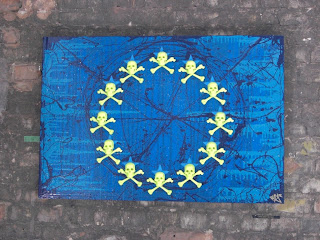The sky is black with PIIGS coming home to roost: I was going to write my customary long and boring think piece—but the simmering crisis in the Eurozone just got the heat turned up: Things are boiling over there!

“Euro Dead” by Ryca.
So let’s take a break from our regularly scheduled programming, and give you a run-down of this late-breaking news:
The bond markets have no faith in Ireland—Greece has been shown up as having liedagain about its atrocious fiscal situation—and now Portugal is teetering—
—in other words, the PIIGS are screwed. I would venture to guess that we are about to see this slow-boiling European crisis bubble over into a full blown meltdown over the next few days—and it’s going to get messy.
So to keep everything straight, let’s recap:
The spreads on Irish sovereign debt widened, and the Germans are pressing them to accept a bailout—despite the fact that the Irish government is fully funded until the middle of 2011. But it’s not the Irish fiscal situation that the bond markets or the Germans are worried about—it’s the Irish banking sector that is freaking everyone out.
After all, the Irish government fully—and very foolishly—backed the insolvent Irish banks back in 2008. And for unexplained reasons, the Irish government is committed to honoring Irish bank bonds fully—which the country simply cannot afford. However, German banks are heavily exposed to Irish banks, which explains why Berlin is so eager to have Ireland accept a bailout.
Right now, European Union, International Monetary Fund and European Central Bank officials are meeting with Irish representatives, putting together a bail-out package. The reason the Irish are so leery, of course, is that any bail-out would be accompanied by very severe austerity measures: In other words, the Irish people would suffer the consequences of shoring up the Irish banks—which is the same as saying the Irish people would suffer austerity measures in order to keep German banks from suffering losses. Also, the EU/IMF/ECB bail-out would probably also cost the Irish their precious 12.5% corporate tax rate—a key magnet for bringing capital to the Emerald Isle.
Add to the Irish worry, Greece is once again wearing a bright red conical dunce cap: They’ve been shown up to have lied again about their fiscal situation. Three guesses what they lied about: If you guessed Greek deficit, you win—yesterday, the Greek government officially revised its deficit figures: 15.4% for 2009, and 9.4% for 2010 (as opposed to an original 7.8% projection). Odds are good that these figures will be revised—for the worse—soon enough: Nobody believes anything other than Greece is insolvent.
That’s what’s going on this morning—and as a reaction, the dollar (if you can believe it) is roaring back alive: As I write (noon EST), the Euro is at .3511, the Pound at .5870, gold down to ,333 an ounce, silver .05 an ounce; the dollar is up ¥83.45.
There was no specific reason why things took a turn for the worse today—but this downturn of sentiment has been having a cascading/contagion effect through the rest of Europe:
As a result of the Irish not taking the EU bail-out, Portugal’s debt started to tumble—which has everyone worried. Portugal is looking an awful lot like Greece did five-six months ago: It’s debt spread over the German benchmark is 6.5%, and climbing. Even France’s debt yield spread widened against the German bund—it costs more to insure French debt than it costs to insure Chilean debt (I guess a good “Viva Chile!” would be in order?).
The reason the entire slate of Euro bonds are tumbling is because of Ireland—but the real worry is Spain.
If Ireland and then Portugal go down the tubes, then it would only be a matter of time before Spain is next—and Spain is far larger than Greece, Ireland and Portugal combined.
If Spain goes, then it’s curtains for the whole Eurozone, perhaps even for the European Union as a political entity.
So Germany, the EU, the IMF and the ECB all want to save Ireland as a firewall, against further bond market deterioration.
The problem is, the Irish don’t want to be saved.
Ireland isn’t the only country that doesn’t want the EU/IMF/ECB bail-out of the Irish to happen. Several other EU countries also do not want any more bail-outs, be it of Ireland or Greece or Portugal or anyone else:
Austria has just announced that it is withholding bailout funds to Greece, according to Reuters. The reason, as articulated by Austria’s Finance Minister, Josef Proell, is that they are sick and tired of Greece’s bullshit. He was much more polite, of course, but essentially this is what he said. So Athens won’t be getting any of Austria’s money until there has been “extensive debate”.
Now, the Greek bailout is to the tune of €30 billion—Austria’s end is a measely €190 million: Six tenths of 1% of the total package. But for the political impact of the Austrian government’s decision, their contribution to the bailout fund could be twenty or thirty times as large. More than one government, and more than one political party, is working on slogans along the lines of, “If the Austrians can do it, why can’t we?”






